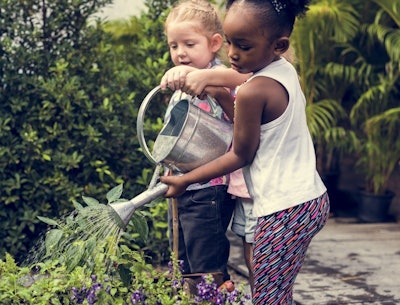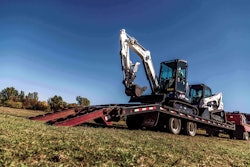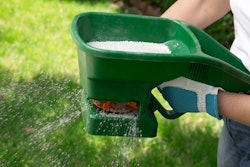
While it may seem out of the ordinary to design a landscape with children in mind, many customers are trying harder and harder to incorporate a little bit of outdoor activity and a love of nature into the lives of their children.
The next time you meet with a customer who has small children, discuss with them some of the benefits gardening can have on them and the myriad of outdoor possibilities ahead.
How gardening affects the brain
With so many scientific principles at play in the everyday garden, this gives parents the chance to use gardens as teachable moments. According to PBS Parents, studies have shown that children who participate in gardening projects scored higher in science achievement than those who did not.
Seeing nature at work can also help spark their curiosity and get them asking questions about the sun, soil, critters, and more. Incorporating a few math lessons – such as measuring the correct amount of soil, counting out vegetables or flowers produced and more – into the activities can also be beneficial.
To help encourage more reading and writing elements into these activities, recommend the idea of having the children keep a photo journal. This gives kids the chance to either draw the plants they see, photograph them or write little snippets about what they see.
If your customers have a vegetable or herb garden, remind them of the multitude of nutritional benefits the brain-building vitamins from these plants can give.
How gardening affects the body
Along with vitamins that help boost the brain, vegetables add to the overall health, wellness, and growth of a child’s developing body, and the act of gardening itself holds many benefits.
Children enjoy being able to play and have hands-on learning experiences, so letting them get down and dirty in the garden can actually help stimulate their immunity and improve their overall health.
According to PBS Parents, the lack of childhood exposure to germs increases a child’s susceptibility to allergies, asthma, and autoimmune conditions by suppressing the development of the immune system.
Gardening also helps provide kids the benefits of sunshine, fresh air, and physical activity, which PBS Parents says has been shown to help kids stay calm and focused.
How gardening helps emotionally
In this high-tech world, kids are exposed more and more every day to screen time, and this can also keep them from establishing connections with other children and family members.
When children spend time outdoors in the garden with siblings or parents, it helps promote team building and communication skills. PBS Parents says that taking time to plan a garden out, harvest or care for what’s planted and discuss the outcomes as a family can help give children a sense of responsibility, mindfulness, and purpose.
Letting kids get a firsthand look at sustainability practices such as recycling, composting, collecting rainwater and more can also help foster a deep love and sense of respect and responsibility to care for the planet.
For all of these reasons and more, gardening is a great skill for children to start learning at a young age.










